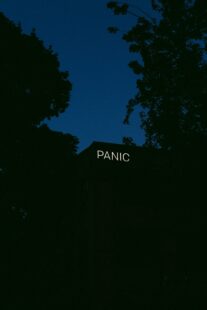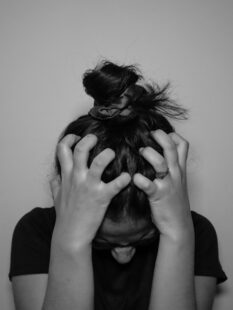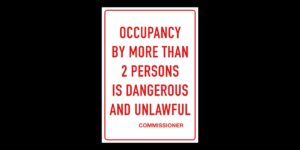Understanding and Coping with Panic Attacks
Karyn George
A panic attack is a sudden feeling of anxiety or terror distinguished by sweating, shallow breathing, and the nervous system being on high alert. These spells can occur unprovoked and without the presence of any danger or threat. It can take anywhere between ten minutes and an hour for a panic attack to pass. Afterward, it is not uncommon to experience a sense of guilt, shame, exhaustion, and emotional drain.
Although singular occurrences are common, most people who experience panic attacks are likely to experience them more than once in their lives. If panic attacks occur frequently, they may be linked to a panic disorder.
However, recurring panic attacks are also co-morbid with diagnoses such bipolar disorder, post-traumatic stress disorder, or obsessive-compulsive disorder. They could also be linked to a specific phobia such as claustrophobia, aerophobia, social phobia, or agoraphobia.
Causes of panic attacks.
 There is no single cause of panic attacks among those who experience them. People of both genders from the ages of thirteen to seventy have been known to experience panic attacks. Their frequency could be connected to factors like genetics, personality, trauma exposure, levels of stress, and brain chemistry. However, none of these may be a factor in a person’s experience of panic attacks.
There is no single cause of panic attacks among those who experience them. People of both genders from the ages of thirteen to seventy have been known to experience panic attacks. Their frequency could be connected to factors like genetics, personality, trauma exposure, levels of stress, and brain chemistry. However, none of these may be a factor in a person’s experience of panic attacks.
When panic attacks are linked to pre-existing conditions, such as phobias and anxiety disorders, we would term this type of panic attack a “situationally bound” or “cued” panic attack. This means there was a definite trigger to the attack. For example, a claustrophobic person will likely experience a panic attack when they get trapped in an elevator. In this instance, fear is triggered and it causes a panic attack.
However, panic attacks may occur out of the blue, even during sleep. These types of panic attacks are called “spontaneous” or “uncued.” In these cases, there is no provable external trigger, though the person experiencing them often tries to find a cause.
They might blame caffeine intake, a medication, or someone else’s presence, but often there is a lack of data to support these theories. These panic attacks can be frustrating and can bring up feelings of shame in the person experiencing them.
The final type of panic attack is the “situationally predisposed” attack. This is similar to the situationally bound attack, where the person is facing a known trigger like a phobia. However, in this case, they experience a delayed reaction.
For example, the claustrophobic person might not experience the attack while trapped in the elevator, but in the car on the way home from the experience, they might suddenly be overcome by terror and anxiety. In such a case, there was a certain trigger, but it had a delayed effect.
In some cases, the person who experiences frequent panic attacks may have a panic disorder. Panic disorder is caused by disproportional amounts of the hormone orexin in the nervous system. Orexin is known as “the vigilance hormone” and, together with other hormones, is responsible for preparing the body to face a threat.
When there is too little of this hormone, narcolepsy can occur. With too much of it, a person will face frequent panic attacks as well as increased blood pressure, heart palpitations, abdominal pains, and dizziness.
Six million Americans are estimated to suffer from panic disorder, meaning that it is not widespread, but is also not uncommon. When panic attacks are frequent and debilitating, it is highly recommended that you see a doctor for a medical diagnosis. All types of panic attacks can be aided by medication, but in the case of panic disorder, medication is vital. Panic disorder is twice as common in women than in men.
Symptoms of a panic attack.
In the same way that people experience panic attacks for different reasons, there are a variety of symptoms that people experience, both emotional and physical. During a panic attack, a person might experience trembling, sweating, dizziness, nausea, numbness or tingling in the hands, a feeling of being choked, chills, and chest pain.
 These can be accompanied by a feeling of losing control, a fear of dying, a feeling of things being unreal (derealization), or of not being in one’s own body (depersonalization).
These can be accompanied by a feeling of losing control, a fear of dying, a feeling of things being unreal (derealization), or of not being in one’s own body (depersonalization).
Even if the attack lasts only minutes, this can be an intense experience. If it happens unbidden and in public, it can also be embarrassing or lead to feelings of shame or fear of it recuring. If the attack was uncued (with no trigger), or even if it was situationally predisposed (delayed effect), a person may be in jeopardy depending on where they are at the time of the attack.
Many untriggered and delayed attacks occur when a person is driving a vehicle. This is a dangerous situation, and so having methods of preventing, coping, or treating panic attacks, is vital for safety.
Preventing panic attacks.
It is not always possible to avoid panic attacks, regardless of what techniques or tactics you use. For example, avoiding a place or person does not ensure that you will not experience another attack, seeing as there may be an unidentifiable trigger. However, there are certain things you could try to prevent them. Of course, it helps to begin with a medical diagnosis, so that you know if you usually experience cued, uncued, or delayed panic attacks.
Generally avoiding stimulants like caffeine is a good start. This does not mean that caffeine is a trigger, but it may be a factor. Maintaining a healthy diet will have a measurable effect on your nervous system, since different kinds of food affect the production of certain hormones.
As we know, hormones affect our bodies. Even with medication, it is good practice to monitor food intake and avoid highly processed food or food that is high on the glycemic index chart.
Along with avoiding certain stimulants, it is also advisable to refrain from alcohol if you are experiencing frequent panic attacks. Alcohol is both a depressant and a stimulant. In fact, alcohol increases cortisol as it leaves the blood stream. Alcohol can also contribute to the negative feelings that surround debilitating attacks, like shame and depression.
 Maintaining a regular physical regime is also extremely important because it ensures a distribution of vital hormones, like testosterone, epinephrine, norepinephrine, and endorphins, to name a few. These balance the anxiety hormones that are activated in a panic attack. An important part of working out is learning how to breathe properly, and this becomes vital during a panic attack.
Maintaining a regular physical regime is also extremely important because it ensures a distribution of vital hormones, like testosterone, epinephrine, norepinephrine, and endorphins, to name a few. These balance the anxiety hormones that are activated in a panic attack. An important part of working out is learning how to breathe properly, and this becomes vital during a panic attack.
Mindfulness techniques, such a diaphragmatic breathing, are skills that help us slow down and focus on certain details, while being still and calm. Deep breathing is a powerful tool in the arsenal of someone hoping to prevent panic attacks, as well as anyone dealing with depression, anxiety, or stress.
Doing this prayerfully is also a way to intentionally focus on God and Scripture into your physical, mental, and emotional wellness routines. All of these are ways in which you can boost your immune system in hopes of preventing panic attacks.
Coping with panic attacks.
While it is important to do what we can to remain healthy, it does not necessarily ensure that we will not experience panic attacks. Many panic attacks occur for relatively short periods, and even the longer attacks eventually pass. Therapists recommend developing techniques that will enable you to “ride out” a panic attack. Like the prevention tactics, these are physical, mental, emotional, and spiritual exercises.
Panic attacks primarily affect us physically, affecting our breathing, heart rate, and muscles. Diaphragmatic breathing has an instant calming effect, and it helps us to focus on a doable task. Learning how to count and time your breaths calms, centers, and focuses you. This should be the first thing you do during a panic attack. Tensing and relaxing muscles in a sequence is another method of physically interrupting a panic attack.
Panic attacks also affect us mentally. There are useful grounding techniques to learn for coping with attacks. These can include looking for certain objects in your environment, finding a point of focus to examine (like a point on the horizon), or visualizing a happy place.
Talking with a counselor or therapist to develop some personalized techniques is a good way of preparing to face a panic attack. Simply knowing that you are armed with some techniques (or a tool belt, as I like to call it) is sometimes enough to build confidence and reduce anxiety surrounding panic attacks.
Further help.

Panic attacks can be debilitating and frustrating to deal with. Whether you are seeking medical treatment for them, or you have chosen a different course of action, we recommend that you speak with a counselor for further help. Research continuously shows that it is often the combination of medical and therapeutic intervention that results in the most favorable outcomes for people dealing with panic attacks.
Perhaps the panic attacks you are experiencing are linked to trauma, or maybe they are negatively impacting your life. Whatever the underlying issue or effect of them, a licensed professional will provide support where you truly need it.
“Panic”, Courtesy of Josh Hild, Unsplash.com, CC0 License; “Stressed”, Courtesy of Simran Sood, Unsplash.com, CC0 License; “Tunnel”, Courtesy of Eri Pançi, Unsplash.com, CC0 License; “Anxious”, Courtesy of Priscilla Du Preez, Unsplash.com, CC0 License







